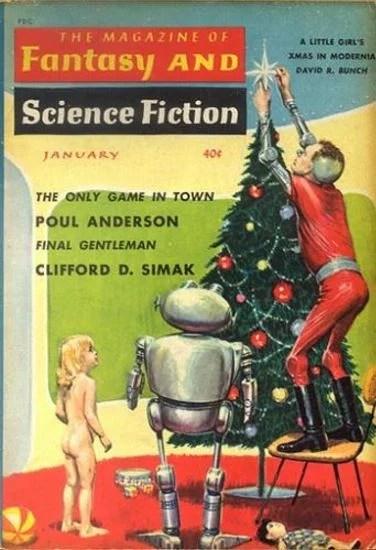
I've got a long-running feud going on with Mike Glyer, editor of the popular fanzine, File 770. Well, feud is probably too strong a word given that we're good friends and avid mutual readers. In fact, we usually get along quite well. All fans are united by love for the genre and our status as oddballs, after all. But Mike and I just can't seem to agree on Analog, a monthly science fiction magazine.
Here are the indisputable facts: Analog is the elder statesman of the digests; it pioneered real sf back when all the other outlets were pushing pulp adventure. Analog has the biggest circulation of any of the current digests, somewhere around 200,000 per month.
Now for the disputable ones. Analog is the most conservative of the mags. It's generally Terran-centric, with Earthlings portrayed as the most cunning, successful beings in the galaxy (which is why, of course, most aliens look just like us). While the serialized novels in Analog are often excellent, the accompanying short stories tend to be uninspiring. The science fact columns are awful. Editor John Campbell's championing of psionics and reactionless engines (in real-life, not just fiction), crosses into the embarrassing. All these factors make Analog the weakest of the Big Three magazines, consistently lagging in quality behind Galaxy and The Magazine of Fantasy and Science Fiction.
Of course, Mike disagrees. He's even wagered that Analog will take the Hugo award for Best Science Fiction Magazine this year. I think he's dreaming. F&SF has won three years in a row, and barring some unexpected decline in quality, it will do so again.
I'll take that bet, Mike Glyer! Two beers to your one.
As evidence for my case, I present this month's Analog, dated June 1961.

I will give Campbell credit where it is due. While women are rare in Analog (as they are everywhere in published sf lit), Campbell does make an effort to "discover" female authors. That's how we got the delightful Pauline Ashwell, and now we have the promising Leigh Richmond. Her first story, Prologue to an Analogue, involves a coven of witches that solves world crisis after world crisis with their televised incantations. Is it sorcery, technology, or something entirely different? A story that manages to be both Campbellian yet also pretty neat. Three stars.
I'm not sure why L. Sprague de Camp's Apollonious Enlists was included. Normally, Sprague writes fun, light fantasy. This piece is non-fiction, an essay on the labyrinthine bureaucracy of Ptolemaic Egypt, with some pointed parallels drawn with our modern methods of government. I guess there weren't any fiction vignettes handy to fill the 8-page slot. Two stars.
Fallen Angel shows us a far future in which the Terran dominion is but a small corner of a larger Galactic Federation. We have something of an inferiority complex as, compared to the blond, perfect Grienan, leader race of the Federation, humanity seems barely out of childhood. In fact, we have only made it as far as we have thanks to "Experiment," an anarchistic enclave in which humans express their base impulses until they are thoroughly tired of them. Only a small proportion of the population are truly incurable, and they become permanent residents. It's a program that seems barbaric to the rest of the civilized galaxy and is ridiculed accordingly.
In Angel, the aristocratic Grienan are taken down a peg when its ambassador volunteers to go through Experiment and loses all of his highfalutin culture and manners, almost losing his very humanity (Grienanity?) See? Terrans really do know best!
High is a prolific writer who's hitherto stayed on the British side of The Pond. His latest work does little to recommend that he emigrate. Two stars.
Lloyd Biggle Jr. is like a Cepheid star – highly variable. His latest, Monument, may be the high point of his career to date. I wasn't optimistic. The set-up involves a backward paradise planet, populated by (of course) completely human aliens, a marooned Terran who vows to protect the natives from a rapacious Earth Federation, and the inevitable coming of the representatives of said polity. There's no real science fiction in this tale of classic exploitation – you could transplant the "aliens" to an island in the Pacific Ocean and replace the Federation with the United Nations (and, perhaps, that's the point; I prefer my analogies slightly less direct).
And yet. It's a well-told story, engaging throughout, and it's fundamentally an honest one. There are no gimmicks or silly twists. Just a series of interesting scenes, compelling characters, and a problem to be solved. Four stars.

The science fact this month, George Willard's The Complex Problem of the Simple Weather Rocket starts well enough, describing the armada of radio balloons deployed daily by meteorological agencies, but it quickly degenerates into a fannish gush, recommending a switch to little sounding rockets based on the machines currently employed by model rocket enthusiasts. Kind of a pointless article, especially given that weather balloons are cheap, and now they are augmented by the TIROS weather satellites with their hourly photos. Two stars.
That leaves the third installment of Cliff Simak's very good serial, The Fisherman, which I won't review until it's all done next month. Running the numbers, Analog clocks in at a straight three of five stars: acceptable, but not astonishing. Certainly not Hugo material. At least not this year…

Sneak preview: Last night, the Young Traveler and I went to the drive-in to take in George Pal's latest, Atlantis: the Lost Continent. It was a hoot, and we'll tell you all about it next time…on Galactic Journey!























